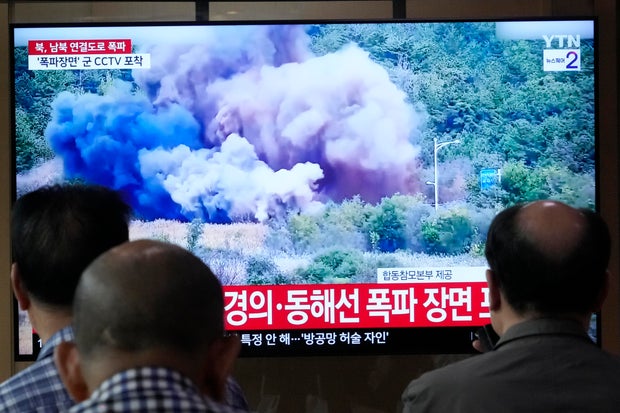CBS News
North Korea blows up parts of inter-Korean roads on its territory, South says, as tensions between the two keep rising

Seoul, South Korea — North Korea blew up the northern parts of inter-Korean roads no longer in use on Tuesday, South Korea said, after the rivals exchanged threats of destruction amid rising animosities over North Korea’s claim that South Korea flew drones over its capital.
The roads’ demolition is a display of North Korea’s growing loathing of South Korea’s conservative government as its leader, Kim Jong Un, has vowed to sever relations with South Korea and abandon the goal of achieving peaceful Korean unification.
Ahn Young-joon / AP
Observers say it’s still unlikely that Kim will launch preemptive, large-scale attacks on South Korea because that would certainly invite massive retaliation by the superior South Korea-U.S. force, which would pose a threat to his survival.
South Korea’s Joint Chiefs of Staff also the South’s military fired warning shots south of the military line dividing the two nations, adding that the shots didn’t cause any damage on Seoul’s side of the border. It wasn’t immediately known whether North Korea responded.
South Korea’s military has said it’s bolstering its readiness and surveillance posture in coordination with the United States.
Video provided by South Korea’s military showed a cloud of white and gray smoke emerging from the explosion at a road near the border town of Kaesong and North Korea sending trucks and excavators to clear out the debris. Another video showed smoke emerging from a coastal road near the Korea’s eastern border.
Yang Moo-jin, president of the University of North Korean Studies in Seoul, told Agence France-Presse Pyongyang might also intend to put up more physical barriers along the border and the road detonations could be “preparatory work for its construction of those walls.”
North Korea has a history of staging choreographed events to destroy facilities on its soil as a political message.
In 2020, Pyonyang blew up an empty, South Korean-built liaison office building just north of the border in retaliation for South Korean civilian leafleting campaigns. In 2018, North Korea demolished tunnels at its nuclear testing site at the start of nuclear diplomacy with the U.S. In 2008, the North blew up a cooling tower at its main nuclear complex when earlier disarmament-for-aid negotiations with the U.S. and others were alive.
Destroying the roads would be in line with Kim’s order in January to eliminate the goal of a peaceful Korean unification, formally designate South Korea as the country’s “invariable principal enemy” and define the North’s sovereign, territorial sphere. Kim’s order stunned many Pyongyang observers outside North Korea because it seemed to break from his predecessors’ long-cherished dreams of unifying the Korean Peninsula on the North’s terms.
Experts say Kim likely aims to diminish South Korea’s voice in the regional nuclear standoff and seek direct dealings with the U.S. They say Kim also probably hopes to diminish South Korea’s cultural influence and bolster his rule at home.
North Korea has accused South Korea of infiltrating drones to drop propaganda leaflets over Pyongyang three times this month and threatened to respond with force if it happened again. South Korea has refused to confirm whether it sent drones but warned North Korea would face the end of its regime if the safety of South Korean citizens is threatened.
North Korea put frontline artillery and other army units on standby to launch strikes on South Korea, if drones from South Korea are found over North Korea again. North Korea’s Defense Ministry said all of South Korea “might turn into piles of ashes” following the North’s powerful attack.
North Korea’s state media reported earlier Tuesday that Kim had called a meeting with his top military and security officials the previous day. During the meeting, Kim described the alleged South Korean drone flights as the “enemy’s serious provocation” and laid out unspecified tasks related to “immediate military action” and the operation of his “war deterrent” for defending the country’s sovereignty, the North’s Korean Central News Agency said.
During the previous era of inter-Korean detente in the 2000s, the two Koreas reconnected two road routes and two rail tracks across their heavily fortified border. But their operations later were suspended one-by-one as the Koreas wrangled over North Korea’s nuclear program and other issues.
Last week, North Korea said it would permanently block its border with South Korea and build front-line defense structures to cope with “confrontational hysteria” by South Korean and U.S. forces. South Korean officials said North Korea had been adding anti-tank barriers and laying mines along the border since earlier this year. They said North Korea has also planted mines and removed lamps along its sections of the inter-Korean roads and taken out ties on the northern side of the railways.
Tensions on the Korean Peninsula have sharply increased in recent years, with North Korea performing a run of provocative missile tests and South Korea and the U.S. expanding their military drills.
CBS News
Saturday Sessions: Amythyst Kiah performs “Empire Of Love”

Watch CBS News
Be the first to know
Get browser notifications for breaking news, live events, and exclusive reporting.
CBS News
New book from famed photographer focuses on the forces behind the global food chain

Watch CBS News
Be the first to know
Get browser notifications for breaking news, live events, and exclusive reporting.
CBS News
USPS announces Betty White stamp will be released in 2025

Legendary TV icon Betty White will be honored in 2025 with a stamp, the U.S. Postal Service announced on Friday.
The “Golden Girls” and “Mary Tyler Moore Show” actor “shared her wit and warmth with viewers for seven decades,” the news release from the USPS read.
U.S. Postal Service
“The comedic actor, who gained younger generations of fans as she entered her 90s, was also revered as a compassionate advocate for animals,” the USPS said.
The image of White, who died in 2021, was created based on a 2010 photograph, the USPS said. The USPS said the list of new stamps released on Friday is a partial one, with additional stamps to be announced in the coming weeks and months.
“This early glimpse into our 2025 stamp program demonstrates our commitment to providing a diverse range of subjects and designs for both philatelists and stamp enthusiasts,” said Lisa Bobb-Semple, stamp services director for USPS.
White launched her TV career in daytime talk shows when the medium was still in its infancy and endured well into the age of cable and streaming. Her combination of sweetness and edginess gave life to a roster of quirky characters in shows from the sitcom “Life With Elizabeth” in the early 1950s to oddball Rose Nylund in “The Golden Girls” in the ’80s to “Boston Legal,” which ran from 2004 to 2008.
White died in December 2021. She was 99 and just a few weeks shy of what would have been her 100th birthday on Jan. 17.
When asked how she had managed to be universally beloved during her long career, White summed it up with a dimpled smile: “I just make it my business to get along with people so I can have fun. It’s that simple.”
The USPS said it will also honor pianist and composer Allen Toussaint, who died in 2015 at the age of 77.












